Religious Perception on Poverty and Development: Sefwi Awaso, Ghana
VerifiedAdded on 2023/06/14
|22
|5726
|101
Report
AI Summary
This report critically analyzes the influence of religious perception on poverty and its effect on the developmental state of people, using a case study of Sefwi Awaso, Ghana. It investigates how religious beliefs impact human development, hindering the ability to overcome poverty. The research explores different religious faiths, their teachings on poverty, and the role of faith-based NGOs. The study uses mixed methodology, incorporating secondary data from books and journals, along with primary data collected through interviews to understand individual perspectives. The report aims to identify ways to improve perceptions of poverty and promote economic development, questioning if poverty is an act of god.
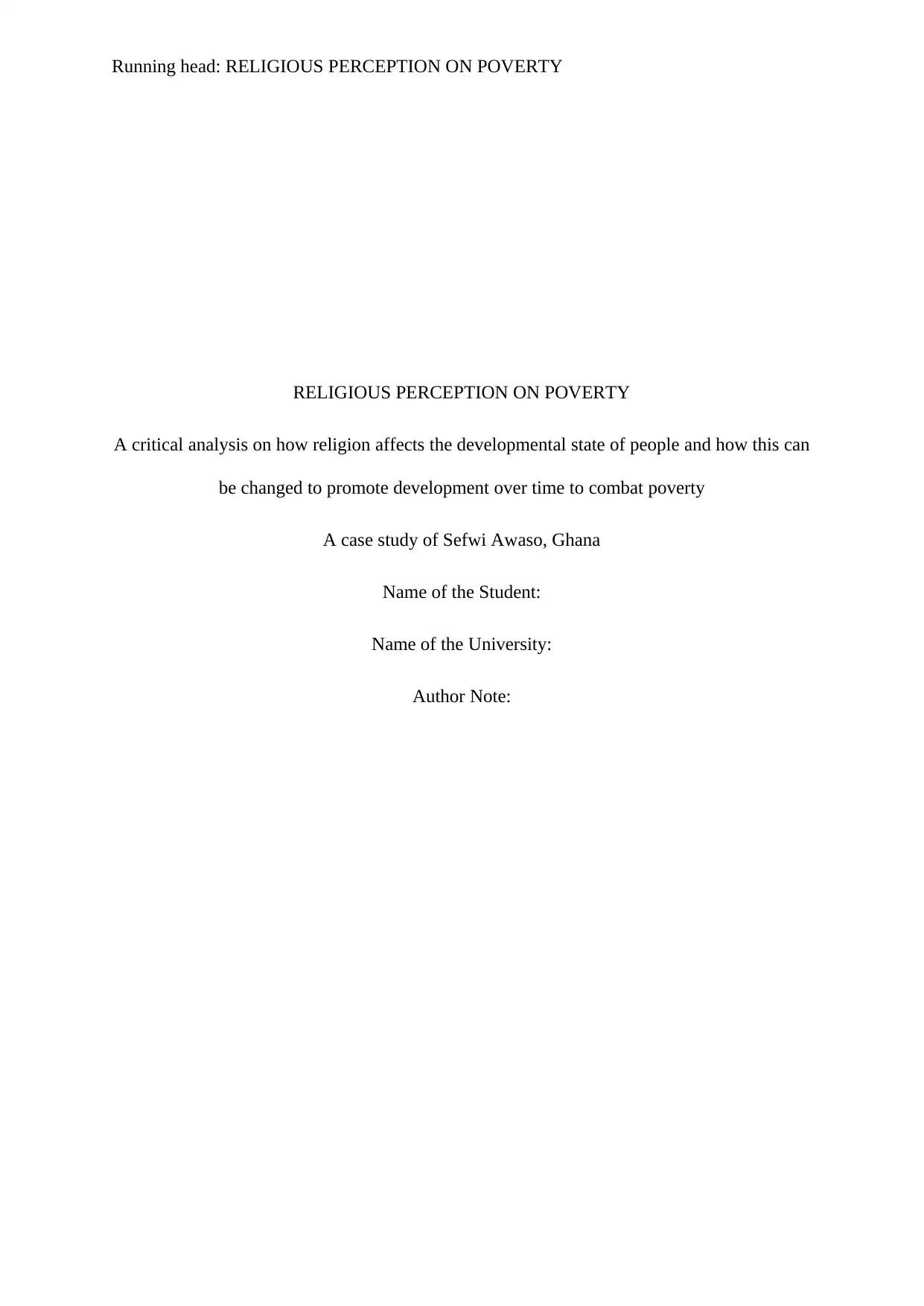
Running head: RELIGIOUS PERCEPTION ON POVERTY
RELIGIOUS PERCEPTION ON POVERTY
A critical analysis on how religion affects the developmental state of people and how this can
be changed to promote development over time to combat poverty
A case study of Sefwi Awaso, Ghana
Name of the Student:
Name of the University:
Author Note:
RELIGIOUS PERCEPTION ON POVERTY
A critical analysis on how religion affects the developmental state of people and how this can
be changed to promote development over time to combat poverty
A case study of Sefwi Awaso, Ghana
Name of the Student:
Name of the University:
Author Note:
Paraphrase This Document
Need a fresh take? Get an instant paraphrase of this document with our AI Paraphraser
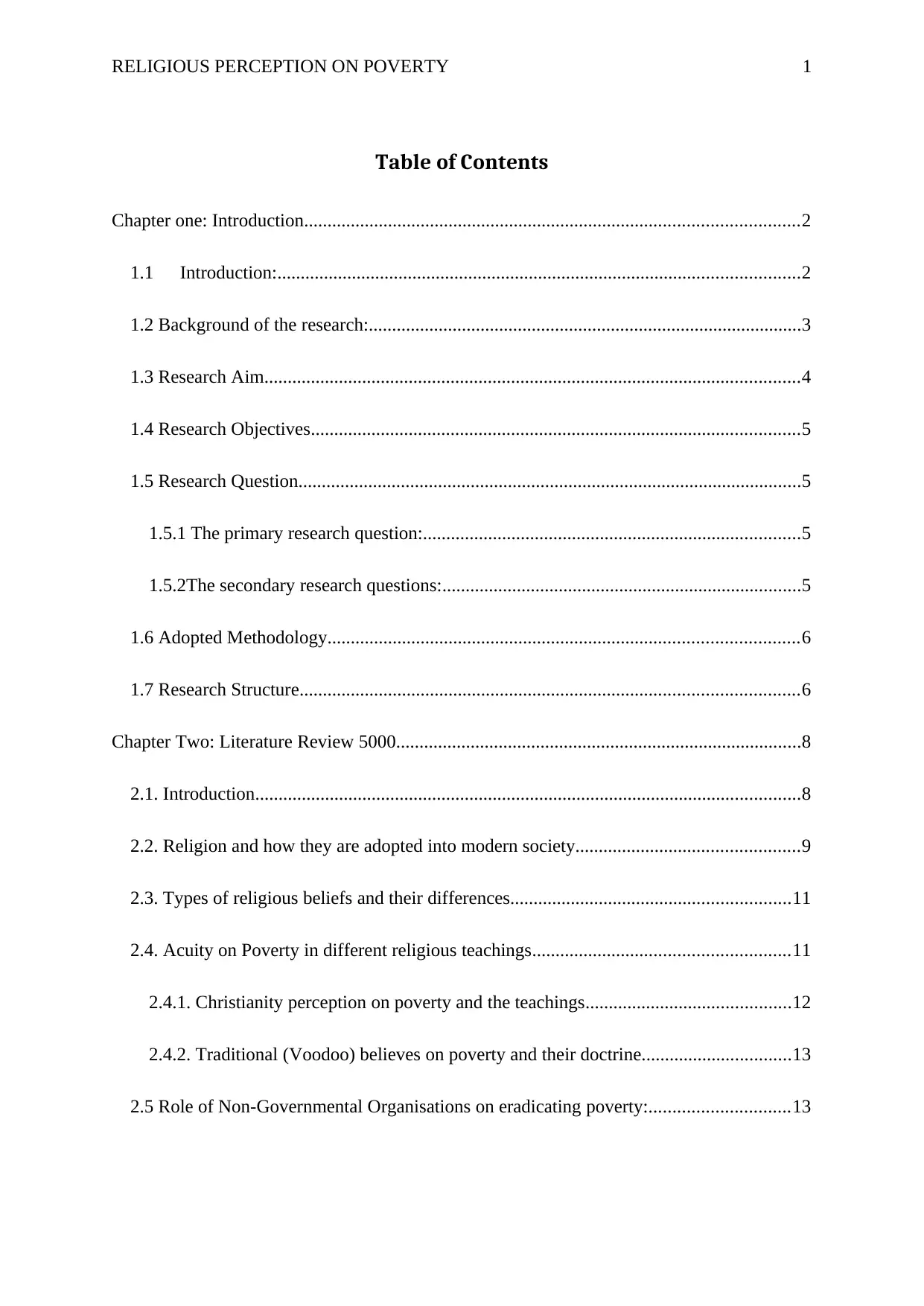
RELIGIOUS PERCEPTION ON POVERTY 1
Table of Contents
Chapter one: Introduction..........................................................................................................2
1.1 Introduction:................................................................................................................2
1.2 Background of the research:.............................................................................................3
1.3 Research Aim...................................................................................................................4
1.4 Research Objectives.........................................................................................................5
1.5 Research Question............................................................................................................5
1.5.1 The primary research question:.................................................................................5
1.5.2The secondary research questions:.............................................................................5
1.6 Adopted Methodology.....................................................................................................6
1.7 Research Structure...........................................................................................................6
Chapter Two: Literature Review 5000.......................................................................................8
2.1. Introduction.....................................................................................................................8
2.2. Religion and how they are adopted into modern society................................................9
2.3. Types of religious beliefs and their differences............................................................11
2.4. Acuity on Poverty in different religious teachings.......................................................11
2.4.1. Christianity perception on poverty and the teachings............................................12
2.4.2. Traditional (Voodoo) believes on poverty and their doctrine................................13
2.5 Role of Non-Governmental Organisations on eradicating poverty:..............................13
Table of Contents
Chapter one: Introduction..........................................................................................................2
1.1 Introduction:................................................................................................................2
1.2 Background of the research:.............................................................................................3
1.3 Research Aim...................................................................................................................4
1.4 Research Objectives.........................................................................................................5
1.5 Research Question............................................................................................................5
1.5.1 The primary research question:.................................................................................5
1.5.2The secondary research questions:.............................................................................5
1.6 Adopted Methodology.....................................................................................................6
1.7 Research Structure...........................................................................................................6
Chapter Two: Literature Review 5000.......................................................................................8
2.1. Introduction.....................................................................................................................8
2.2. Religion and how they are adopted into modern society................................................9
2.3. Types of religious beliefs and their differences............................................................11
2.4. Acuity on Poverty in different religious teachings.......................................................11
2.4.1. Christianity perception on poverty and the teachings............................................12
2.4.2. Traditional (Voodoo) believes on poverty and their doctrine................................13
2.5 Role of Non-Governmental Organisations on eradicating poverty:..............................13
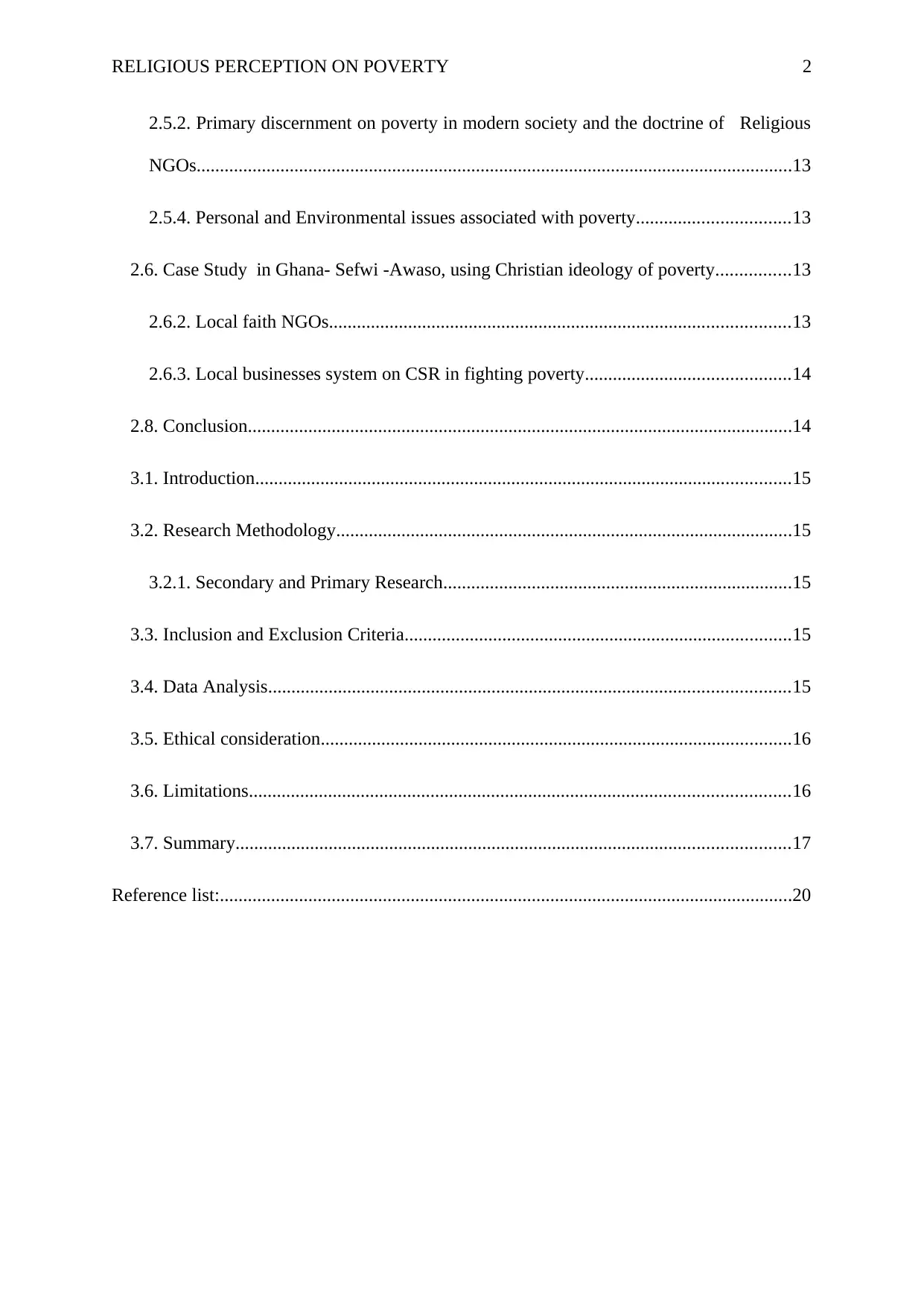
RELIGIOUS PERCEPTION ON POVERTY 2
2.5.2. Primary discernment on poverty in modern society and the doctrine of Religious
NGOs................................................................................................................................13
2.5.4. Personal and Environmental issues associated with poverty.................................13
2.6. Case Study in Ghana- Sefwi -Awaso, using Christian ideology of poverty................13
2.6.2. Local faith NGOs...................................................................................................13
2.6.3. Local businesses system on CSR in fighting poverty............................................14
2.8. Conclusion.....................................................................................................................14
3.1. Introduction...................................................................................................................15
3.2. Research Methodology..................................................................................................15
3.2.1. Secondary and Primary Research...........................................................................15
3.3. Inclusion and Exclusion Criteria...................................................................................15
3.4. Data Analysis................................................................................................................15
3.5. Ethical consideration.....................................................................................................16
3.6. Limitations....................................................................................................................16
3.7. Summary.......................................................................................................................17
Reference list:...........................................................................................................................20
2.5.2. Primary discernment on poverty in modern society and the doctrine of Religious
NGOs................................................................................................................................13
2.5.4. Personal and Environmental issues associated with poverty.................................13
2.6. Case Study in Ghana- Sefwi -Awaso, using Christian ideology of poverty................13
2.6.2. Local faith NGOs...................................................................................................13
2.6.3. Local businesses system on CSR in fighting poverty............................................14
2.8. Conclusion.....................................................................................................................14
3.1. Introduction...................................................................................................................15
3.2. Research Methodology..................................................................................................15
3.2.1. Secondary and Primary Research...........................................................................15
3.3. Inclusion and Exclusion Criteria...................................................................................15
3.4. Data Analysis................................................................................................................15
3.5. Ethical consideration.....................................................................................................16
3.6. Limitations....................................................................................................................16
3.7. Summary.......................................................................................................................17
Reference list:...........................................................................................................................20
⊘ This is a preview!⊘
Do you want full access?
Subscribe today to unlock all pages.

Trusted by 1+ million students worldwide
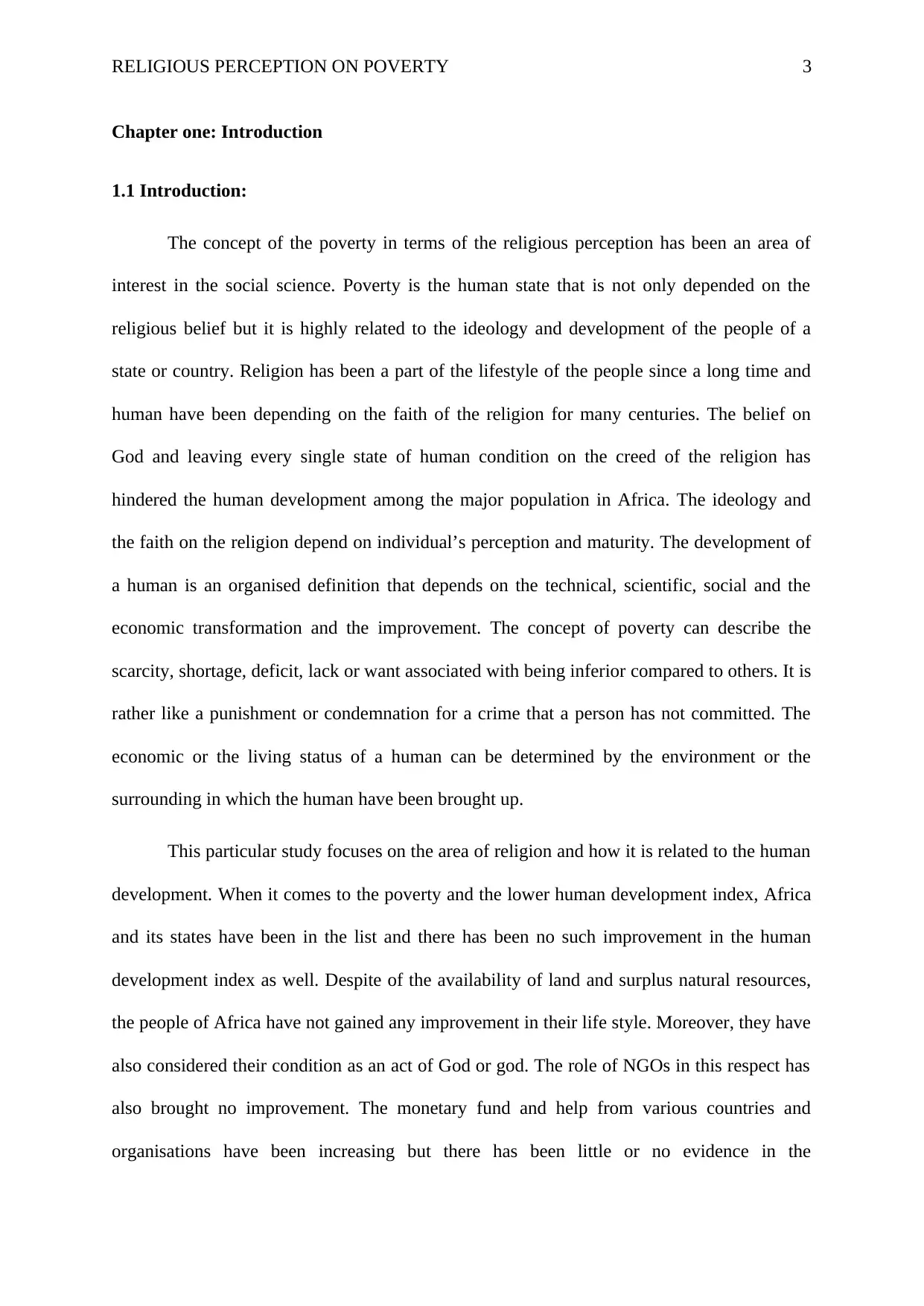
RELIGIOUS PERCEPTION ON POVERTY 3
Chapter one: Introduction
1.1 Introduction:
The concept of the poverty in terms of the religious perception has been an area of
interest in the social science. Poverty is the human state that is not only depended on the
religious belief but it is highly related to the ideology and development of the people of a
state or country. Religion has been a part of the lifestyle of the people since a long time and
human have been depending on the faith of the religion for many centuries. The belief on
God and leaving every single state of human condition on the creed of the religion has
hindered the human development among the major population in Africa. The ideology and
the faith on the religion depend on individual’s perception and maturity. The development of
a human is an organised definition that depends on the technical, scientific, social and the
economic transformation and the improvement. The concept of poverty can describe the
scarcity, shortage, deficit, lack or want associated with being inferior compared to others. It is
rather like a punishment or condemnation for a crime that a person has not committed. The
economic or the living status of a human can be determined by the environment or the
surrounding in which the human have been brought up.
This particular study focuses on the area of religion and how it is related to the human
development. When it comes to the poverty and the lower human development index, Africa
and its states have been in the list and there has been no such improvement in the human
development index as well. Despite of the availability of land and surplus natural resources,
the people of Africa have not gained any improvement in their life style. Moreover, they have
also considered their condition as an act of God or god. The role of NGOs in this respect has
also brought no improvement. The monetary fund and help from various countries and
organisations have been increasing but there has been little or no evidence in the
Chapter one: Introduction
1.1 Introduction:
The concept of the poverty in terms of the religious perception has been an area of
interest in the social science. Poverty is the human state that is not only depended on the
religious belief but it is highly related to the ideology and development of the people of a
state or country. Religion has been a part of the lifestyle of the people since a long time and
human have been depending on the faith of the religion for many centuries. The belief on
God and leaving every single state of human condition on the creed of the religion has
hindered the human development among the major population in Africa. The ideology and
the faith on the religion depend on individual’s perception and maturity. The development of
a human is an organised definition that depends on the technical, scientific, social and the
economic transformation and the improvement. The concept of poverty can describe the
scarcity, shortage, deficit, lack or want associated with being inferior compared to others. It is
rather like a punishment or condemnation for a crime that a person has not committed. The
economic or the living status of a human can be determined by the environment or the
surrounding in which the human have been brought up.
This particular study focuses on the area of religion and how it is related to the human
development. When it comes to the poverty and the lower human development index, Africa
and its states have been in the list and there has been no such improvement in the human
development index as well. Despite of the availability of land and surplus natural resources,
the people of Africa have not gained any improvement in their life style. Moreover, they have
also considered their condition as an act of God or god. The role of NGOs in this respect has
also brought no improvement. The monetary fund and help from various countries and
organisations have been increasing but there has been little or no evidence in the
Paraphrase This Document
Need a fresh take? Get an instant paraphrase of this document with our AI Paraphraser
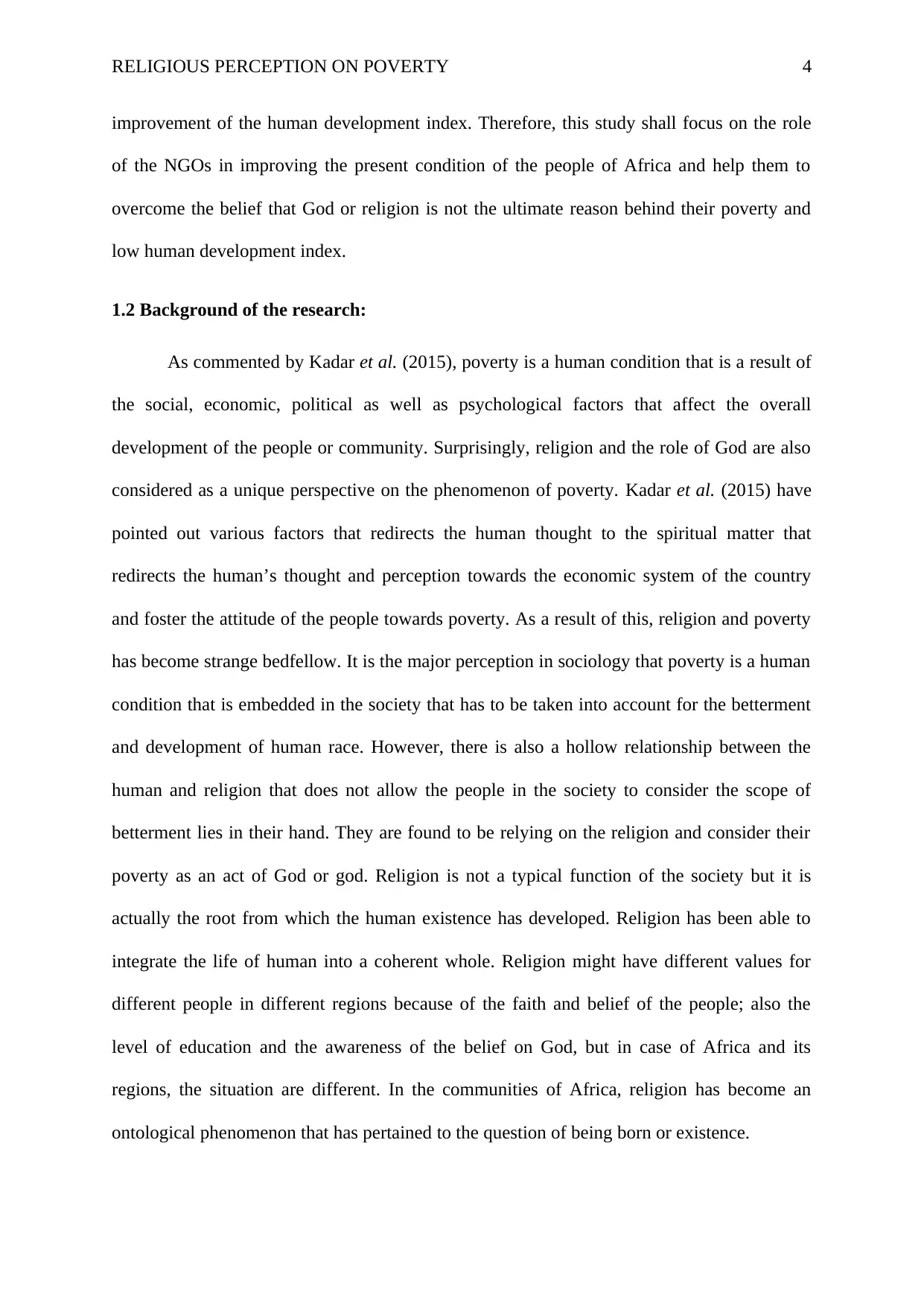
RELIGIOUS PERCEPTION ON POVERTY 4
improvement of the human development index. Therefore, this study shall focus on the role
of the NGOs in improving the present condition of the people of Africa and help them to
overcome the belief that God or religion is not the ultimate reason behind their poverty and
low human development index.
1.2 Background of the research:
As commented by Kadar et al. (2015), poverty is a human condition that is a result of
the social, economic, political as well as psychological factors that affect the overall
development of the people or community. Surprisingly, religion and the role of God are also
considered as a unique perspective on the phenomenon of poverty. Kadar et al. (2015) have
pointed out various factors that redirects the human thought to the spiritual matter that
redirects the human’s thought and perception towards the economic system of the country
and foster the attitude of the people towards poverty. As a result of this, religion and poverty
has become strange bedfellow. It is the major perception in sociology that poverty is a human
condition that is embedded in the society that has to be taken into account for the betterment
and development of human race. However, there is also a hollow relationship between the
human and religion that does not allow the people in the society to consider the scope of
betterment lies in their hand. They are found to be relying on the religion and consider their
poverty as an act of God or god. Religion is not a typical function of the society but it is
actually the root from which the human existence has developed. Religion has been able to
integrate the life of human into a coherent whole. Religion might have different values for
different people in different regions because of the faith and belief of the people; also the
level of education and the awareness of the belief on God, but in case of Africa and its
regions, the situation are different. In the communities of Africa, religion has become an
ontological phenomenon that has pertained to the question of being born or existence.
improvement of the human development index. Therefore, this study shall focus on the role
of the NGOs in improving the present condition of the people of Africa and help them to
overcome the belief that God or religion is not the ultimate reason behind their poverty and
low human development index.
1.2 Background of the research:
As commented by Kadar et al. (2015), poverty is a human condition that is a result of
the social, economic, political as well as psychological factors that affect the overall
development of the people or community. Surprisingly, religion and the role of God are also
considered as a unique perspective on the phenomenon of poverty. Kadar et al. (2015) have
pointed out various factors that redirects the human thought to the spiritual matter that
redirects the human’s thought and perception towards the economic system of the country
and foster the attitude of the people towards poverty. As a result of this, religion and poverty
has become strange bedfellow. It is the major perception in sociology that poverty is a human
condition that is embedded in the society that has to be taken into account for the betterment
and development of human race. However, there is also a hollow relationship between the
human and religion that does not allow the people in the society to consider the scope of
betterment lies in their hand. They are found to be relying on the religion and consider their
poverty as an act of God or god. Religion is not a typical function of the society but it is
actually the root from which the human existence has developed. Religion has been able to
integrate the life of human into a coherent whole. Religion might have different values for
different people in different regions because of the faith and belief of the people; also the
level of education and the awareness of the belief on God, but in case of Africa and its
regions, the situation are different. In the communities of Africa, religion has become an
ontological phenomenon that has pertained to the question of being born or existence.
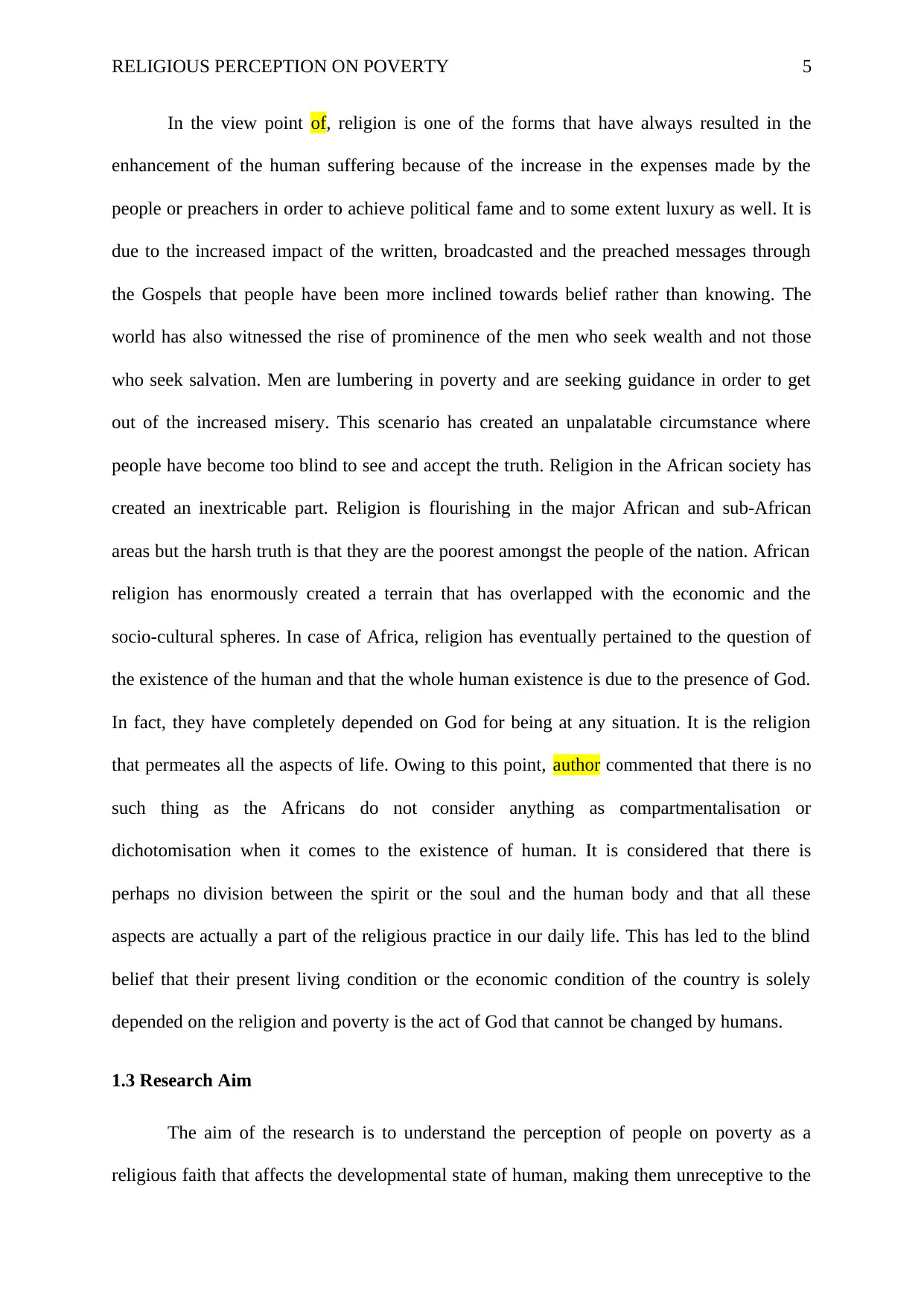
RELIGIOUS PERCEPTION ON POVERTY 5
In the view point of, religion is one of the forms that have always resulted in the
enhancement of the human suffering because of the increase in the expenses made by the
people or preachers in order to achieve political fame and to some extent luxury as well. It is
due to the increased impact of the written, broadcasted and the preached messages through
the Gospels that people have been more inclined towards belief rather than knowing. The
world has also witnessed the rise of prominence of the men who seek wealth and not those
who seek salvation. Men are lumbering in poverty and are seeking guidance in order to get
out of the increased misery. This scenario has created an unpalatable circumstance where
people have become too blind to see and accept the truth. Religion in the African society has
created an inextricable part. Religion is flourishing in the major African and sub-African
areas but the harsh truth is that they are the poorest amongst the people of the nation. African
religion has enormously created a terrain that has overlapped with the economic and the
socio-cultural spheres. In case of Africa, religion has eventually pertained to the question of
the existence of the human and that the whole human existence is due to the presence of God.
In fact, they have completely depended on God for being at any situation. It is the religion
that permeates all the aspects of life. Owing to this point, author commented that there is no
such thing as the Africans do not consider anything as compartmentalisation or
dichotomisation when it comes to the existence of human. It is considered that there is
perhaps no division between the spirit or the soul and the human body and that all these
aspects are actually a part of the religious practice in our daily life. This has led to the blind
belief that their present living condition or the economic condition of the country is solely
depended on the religion and poverty is the act of God that cannot be changed by humans.
1.3 Research Aim
The aim of the research is to understand the perception of people on poverty as a
religious faith that affects the developmental state of human, making them unreceptive to the
In the view point of, religion is one of the forms that have always resulted in the
enhancement of the human suffering because of the increase in the expenses made by the
people or preachers in order to achieve political fame and to some extent luxury as well. It is
due to the increased impact of the written, broadcasted and the preached messages through
the Gospels that people have been more inclined towards belief rather than knowing. The
world has also witnessed the rise of prominence of the men who seek wealth and not those
who seek salvation. Men are lumbering in poverty and are seeking guidance in order to get
out of the increased misery. This scenario has created an unpalatable circumstance where
people have become too blind to see and accept the truth. Religion in the African society has
created an inextricable part. Religion is flourishing in the major African and sub-African
areas but the harsh truth is that they are the poorest amongst the people of the nation. African
religion has enormously created a terrain that has overlapped with the economic and the
socio-cultural spheres. In case of Africa, religion has eventually pertained to the question of
the existence of the human and that the whole human existence is due to the presence of God.
In fact, they have completely depended on God for being at any situation. It is the religion
that permeates all the aspects of life. Owing to this point, author commented that there is no
such thing as the Africans do not consider anything as compartmentalisation or
dichotomisation when it comes to the existence of human. It is considered that there is
perhaps no division between the spirit or the soul and the human body and that all these
aspects are actually a part of the religious practice in our daily life. This has led to the blind
belief that their present living condition or the economic condition of the country is solely
depended on the religion and poverty is the act of God that cannot be changed by humans.
1.3 Research Aim
The aim of the research is to understand the perception of people on poverty as a
religious faith that affects the developmental state of human, making them unreceptive to the
⊘ This is a preview!⊘
Do you want full access?
Subscribe today to unlock all pages.

Trusted by 1+ million students worldwide
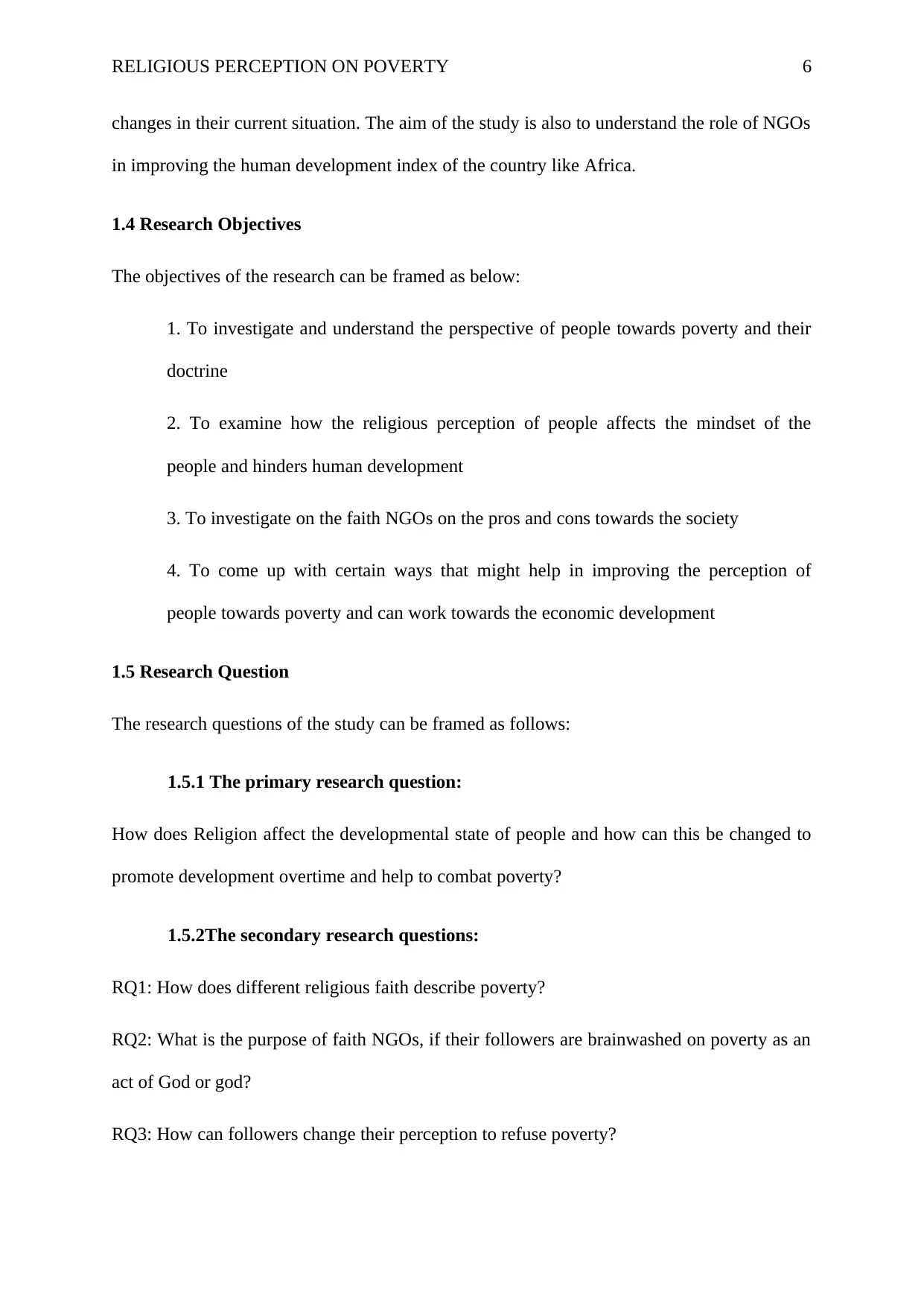
RELIGIOUS PERCEPTION ON POVERTY 6
changes in their current situation. The aim of the study is also to understand the role of NGOs
in improving the human development index of the country like Africa.
1.4 Research Objectives
The objectives of the research can be framed as below:
1. To investigate and understand the perspective of people towards poverty and their
doctrine
2. To examine how the religious perception of people affects the mindset of the
people and hinders human development
3. To investigate on the faith NGOs on the pros and cons towards the society
4. To come up with certain ways that might help in improving the perception of
people towards poverty and can work towards the economic development
1.5 Research Question
The research questions of the study can be framed as follows:
1.5.1 The primary research question:
How does Religion affect the developmental state of people and how can this be changed to
promote development overtime and help to combat poverty?
1.5.2The secondary research questions:
RQ1: How does different religious faith describe poverty?
RQ2: What is the purpose of faith NGOs, if their followers are brainwashed on poverty as an
act of God or god?
RQ3: How can followers change their perception to refuse poverty?
changes in their current situation. The aim of the study is also to understand the role of NGOs
in improving the human development index of the country like Africa.
1.4 Research Objectives
The objectives of the research can be framed as below:
1. To investigate and understand the perspective of people towards poverty and their
doctrine
2. To examine how the religious perception of people affects the mindset of the
people and hinders human development
3. To investigate on the faith NGOs on the pros and cons towards the society
4. To come up with certain ways that might help in improving the perception of
people towards poverty and can work towards the economic development
1.5 Research Question
The research questions of the study can be framed as follows:
1.5.1 The primary research question:
How does Religion affect the developmental state of people and how can this be changed to
promote development overtime and help to combat poverty?
1.5.2The secondary research questions:
RQ1: How does different religious faith describe poverty?
RQ2: What is the purpose of faith NGOs, if their followers are brainwashed on poverty as an
act of God or god?
RQ3: How can followers change their perception to refuse poverty?
Paraphrase This Document
Need a fresh take? Get an instant paraphrase of this document with our AI Paraphraser
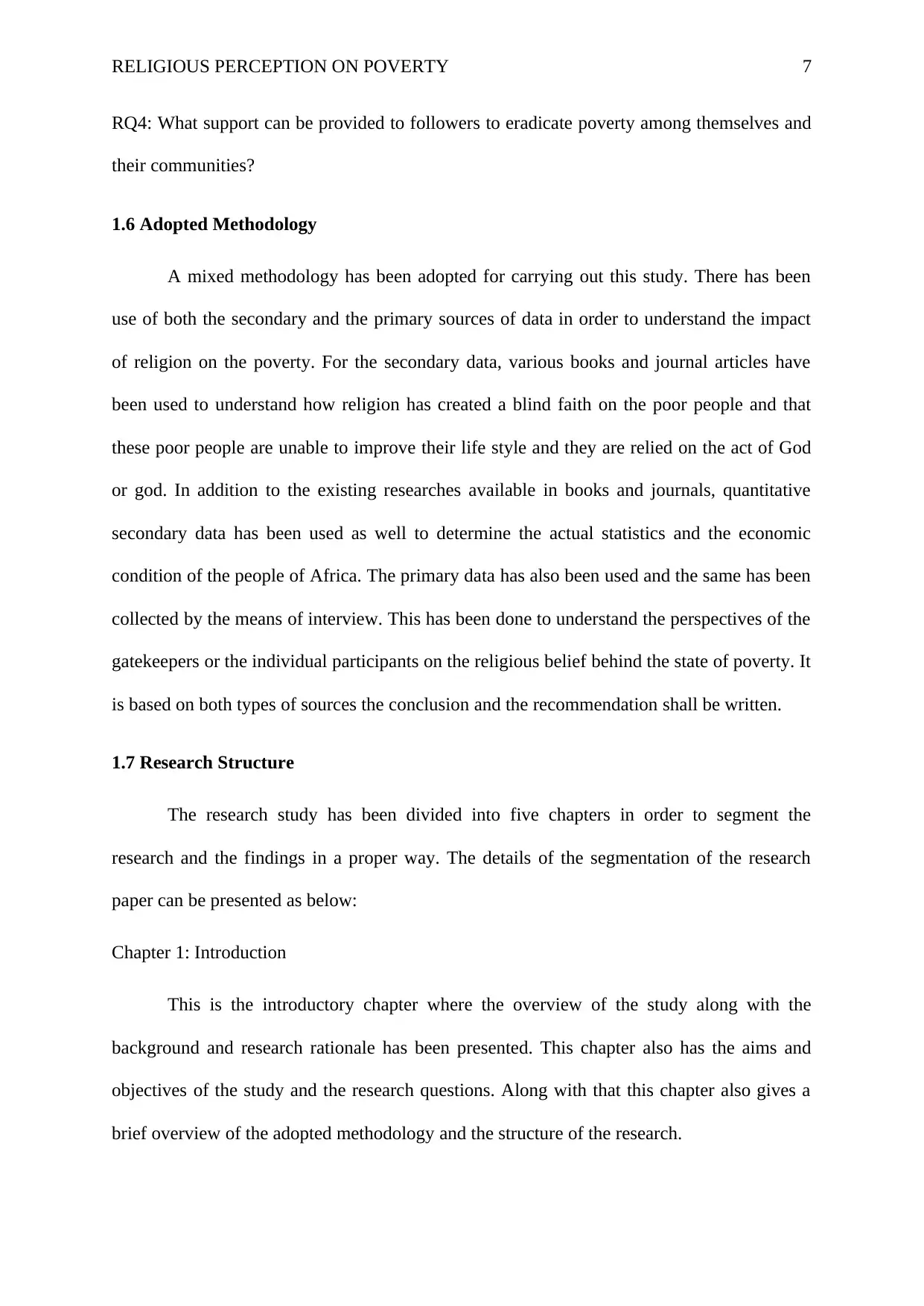
RELIGIOUS PERCEPTION ON POVERTY 7
RQ4: What support can be provided to followers to eradicate poverty among themselves and
their communities?
1.6 Adopted Methodology
A mixed methodology has been adopted for carrying out this study. There has been
use of both the secondary and the primary sources of data in order to understand the impact
of religion on the poverty. For the secondary data, various books and journal articles have
been used to understand how religion has created a blind faith on the poor people and that
these poor people are unable to improve their life style and they are relied on the act of God
or god. In addition to the existing researches available in books and journals, quantitative
secondary data has been used as well to determine the actual statistics and the economic
condition of the people of Africa. The primary data has also been used and the same has been
collected by the means of interview. This has been done to understand the perspectives of the
gatekeepers or the individual participants on the religious belief behind the state of poverty. It
is based on both types of sources the conclusion and the recommendation shall be written.
1.7 Research Structure
The research study has been divided into five chapters in order to segment the
research and the findings in a proper way. The details of the segmentation of the research
paper can be presented as below:
Chapter 1: Introduction
This is the introductory chapter where the overview of the study along with the
background and research rationale has been presented. This chapter also has the aims and
objectives of the study and the research questions. Along with that this chapter also gives a
brief overview of the adopted methodology and the structure of the research.
RQ4: What support can be provided to followers to eradicate poverty among themselves and
their communities?
1.6 Adopted Methodology
A mixed methodology has been adopted for carrying out this study. There has been
use of both the secondary and the primary sources of data in order to understand the impact
of religion on the poverty. For the secondary data, various books and journal articles have
been used to understand how religion has created a blind faith on the poor people and that
these poor people are unable to improve their life style and they are relied on the act of God
or god. In addition to the existing researches available in books and journals, quantitative
secondary data has been used as well to determine the actual statistics and the economic
condition of the people of Africa. The primary data has also been used and the same has been
collected by the means of interview. This has been done to understand the perspectives of the
gatekeepers or the individual participants on the religious belief behind the state of poverty. It
is based on both types of sources the conclusion and the recommendation shall be written.
1.7 Research Structure
The research study has been divided into five chapters in order to segment the
research and the findings in a proper way. The details of the segmentation of the research
paper can be presented as below:
Chapter 1: Introduction
This is the introductory chapter where the overview of the study along with the
background and research rationale has been presented. This chapter also has the aims and
objectives of the study and the research questions. Along with that this chapter also gives a
brief overview of the adopted methodology and the structure of the research.
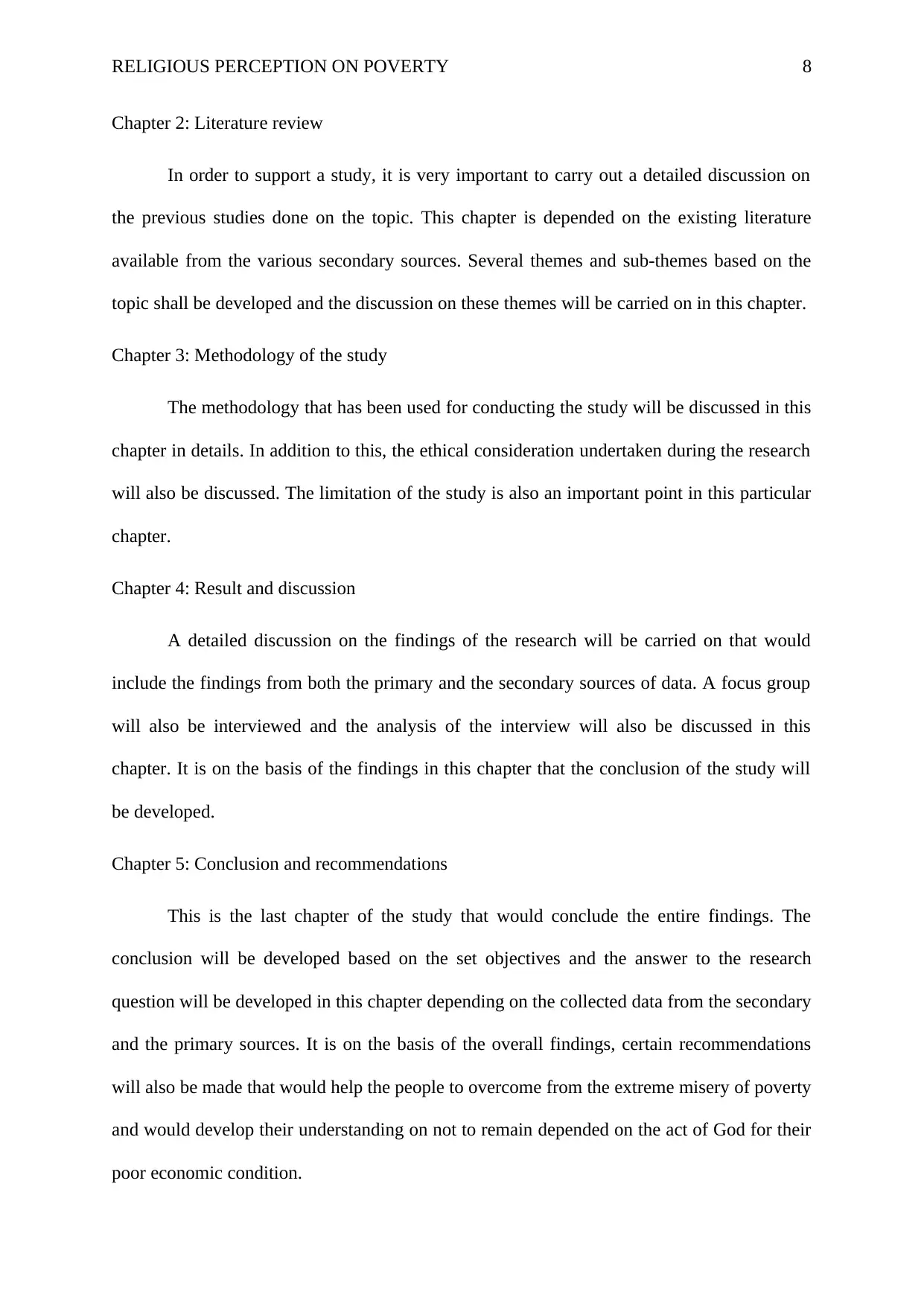
RELIGIOUS PERCEPTION ON POVERTY 8
Chapter 2: Literature review
In order to support a study, it is very important to carry out a detailed discussion on
the previous studies done on the topic. This chapter is depended on the existing literature
available from the various secondary sources. Several themes and sub-themes based on the
topic shall be developed and the discussion on these themes will be carried on in this chapter.
Chapter 3: Methodology of the study
The methodology that has been used for conducting the study will be discussed in this
chapter in details. In addition to this, the ethical consideration undertaken during the research
will also be discussed. The limitation of the study is also an important point in this particular
chapter.
Chapter 4: Result and discussion
A detailed discussion on the findings of the research will be carried on that would
include the findings from both the primary and the secondary sources of data. A focus group
will also be interviewed and the analysis of the interview will also be discussed in this
chapter. It is on the basis of the findings in this chapter that the conclusion of the study will
be developed.
Chapter 5: Conclusion and recommendations
This is the last chapter of the study that would conclude the entire findings. The
conclusion will be developed based on the set objectives and the answer to the research
question will be developed in this chapter depending on the collected data from the secondary
and the primary sources. It is on the basis of the overall findings, certain recommendations
will also be made that would help the people to overcome from the extreme misery of poverty
and would develop their understanding on not to remain depended on the act of God for their
poor economic condition.
Chapter 2: Literature review
In order to support a study, it is very important to carry out a detailed discussion on
the previous studies done on the topic. This chapter is depended on the existing literature
available from the various secondary sources. Several themes and sub-themes based on the
topic shall be developed and the discussion on these themes will be carried on in this chapter.
Chapter 3: Methodology of the study
The methodology that has been used for conducting the study will be discussed in this
chapter in details. In addition to this, the ethical consideration undertaken during the research
will also be discussed. The limitation of the study is also an important point in this particular
chapter.
Chapter 4: Result and discussion
A detailed discussion on the findings of the research will be carried on that would
include the findings from both the primary and the secondary sources of data. A focus group
will also be interviewed and the analysis of the interview will also be discussed in this
chapter. It is on the basis of the findings in this chapter that the conclusion of the study will
be developed.
Chapter 5: Conclusion and recommendations
This is the last chapter of the study that would conclude the entire findings. The
conclusion will be developed based on the set objectives and the answer to the research
question will be developed in this chapter depending on the collected data from the secondary
and the primary sources. It is on the basis of the overall findings, certain recommendations
will also be made that would help the people to overcome from the extreme misery of poverty
and would develop their understanding on not to remain depended on the act of God for their
poor economic condition.
⊘ This is a preview!⊘
Do you want full access?
Subscribe today to unlock all pages.

Trusted by 1+ million students worldwide
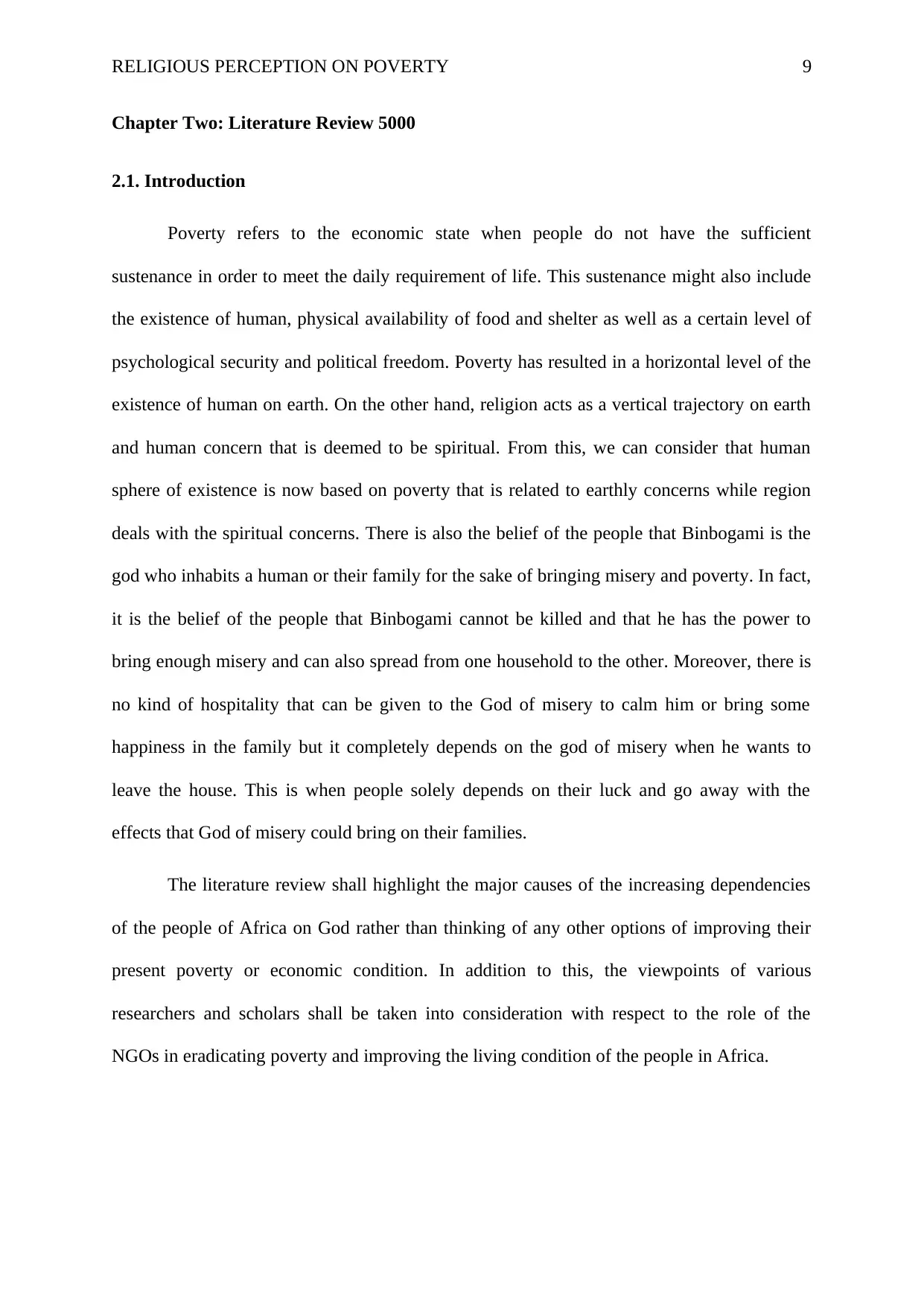
RELIGIOUS PERCEPTION ON POVERTY 9
Chapter Two: Literature Review 5000
2.1. Introduction
Poverty refers to the economic state when people do not have the sufficient
sustenance in order to meet the daily requirement of life. This sustenance might also include
the existence of human, physical availability of food and shelter as well as a certain level of
psychological security and political freedom. Poverty has resulted in a horizontal level of the
existence of human on earth. On the other hand, religion acts as a vertical trajectory on earth
and human concern that is deemed to be spiritual. From this, we can consider that human
sphere of existence is now based on poverty that is related to earthly concerns while region
deals with the spiritual concerns. There is also the belief of the people that Binbogami is the
god who inhabits a human or their family for the sake of bringing misery and poverty. In fact,
it is the belief of the people that Binbogami cannot be killed and that he has the power to
bring enough misery and can also spread from one household to the other. Moreover, there is
no kind of hospitality that can be given to the God of misery to calm him or bring some
happiness in the family but it completely depends on the god of misery when he wants to
leave the house. This is when people solely depends on their luck and go away with the
effects that God of misery could bring on their families.
The literature review shall highlight the major causes of the increasing dependencies
of the people of Africa on God rather than thinking of any other options of improving their
present poverty or economic condition. In addition to this, the viewpoints of various
researchers and scholars shall be taken into consideration with respect to the role of the
NGOs in eradicating poverty and improving the living condition of the people in Africa.
Chapter Two: Literature Review 5000
2.1. Introduction
Poverty refers to the economic state when people do not have the sufficient
sustenance in order to meet the daily requirement of life. This sustenance might also include
the existence of human, physical availability of food and shelter as well as a certain level of
psychological security and political freedom. Poverty has resulted in a horizontal level of the
existence of human on earth. On the other hand, religion acts as a vertical trajectory on earth
and human concern that is deemed to be spiritual. From this, we can consider that human
sphere of existence is now based on poverty that is related to earthly concerns while region
deals with the spiritual concerns. There is also the belief of the people that Binbogami is the
god who inhabits a human or their family for the sake of bringing misery and poverty. In fact,
it is the belief of the people that Binbogami cannot be killed and that he has the power to
bring enough misery and can also spread from one household to the other. Moreover, there is
no kind of hospitality that can be given to the God of misery to calm him or bring some
happiness in the family but it completely depends on the god of misery when he wants to
leave the house. This is when people solely depends on their luck and go away with the
effects that God of misery could bring on their families.
The literature review shall highlight the major causes of the increasing dependencies
of the people of Africa on God rather than thinking of any other options of improving their
present poverty or economic condition. In addition to this, the viewpoints of various
researchers and scholars shall be taken into consideration with respect to the role of the
NGOs in eradicating poverty and improving the living condition of the people in Africa.
Paraphrase This Document
Need a fresh take? Get an instant paraphrase of this document with our AI Paraphraser
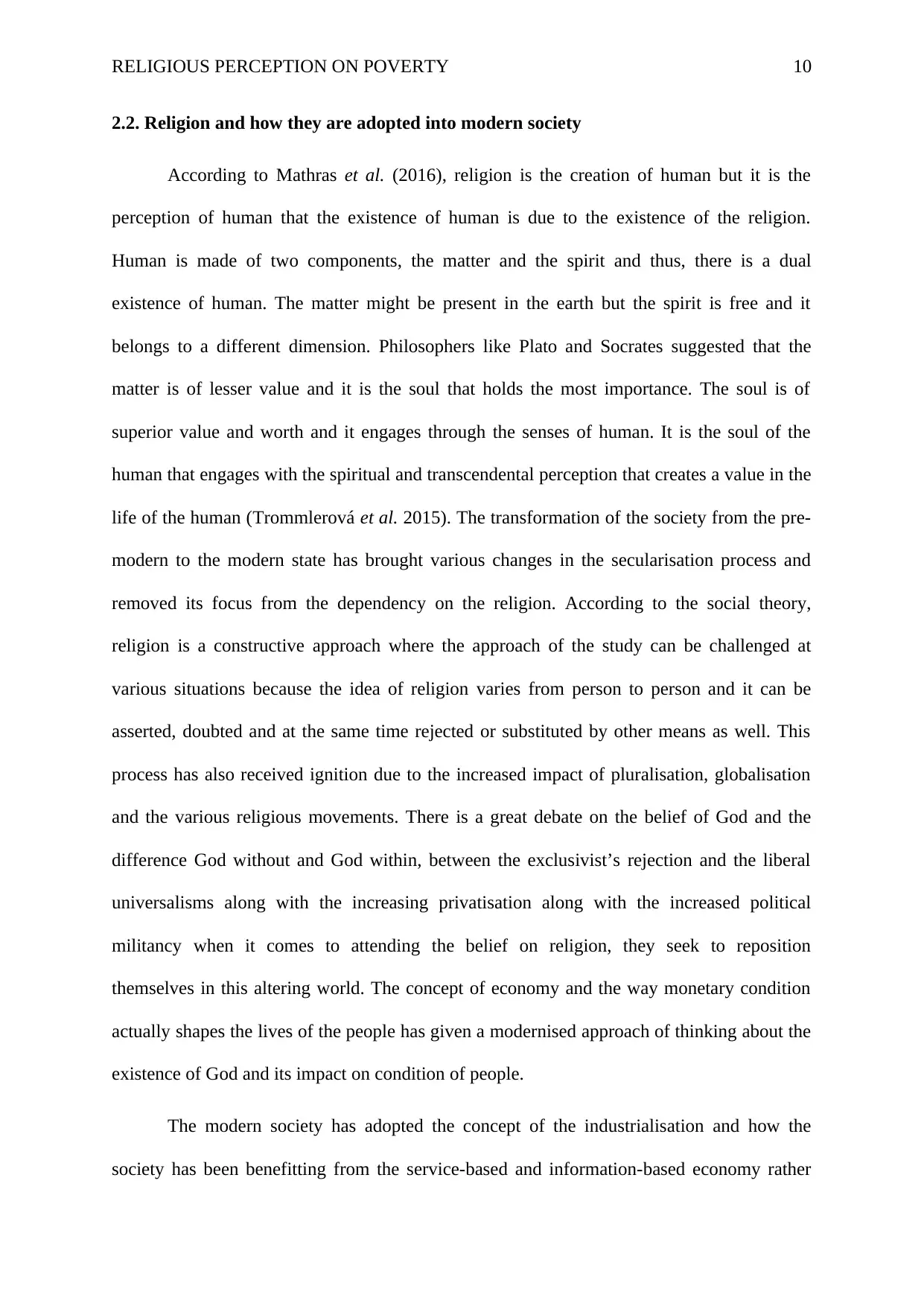
RELIGIOUS PERCEPTION ON POVERTY 10
2.2. Religion and how they are adopted into modern society
According to Mathras et al. (2016), religion is the creation of human but it is the
perception of human that the existence of human is due to the existence of the religion.
Human is made of two components, the matter and the spirit and thus, there is a dual
existence of human. The matter might be present in the earth but the spirit is free and it
belongs to a different dimension. Philosophers like Plato and Socrates suggested that the
matter is of lesser value and it is the soul that holds the most importance. The soul is of
superior value and worth and it engages through the senses of human. It is the soul of the
human that engages with the spiritual and transcendental perception that creates a value in the
life of the human (Trommlerová et al. 2015). The transformation of the society from the pre-
modern to the modern state has brought various changes in the secularisation process and
removed its focus from the dependency on the religion. According to the social theory,
religion is a constructive approach where the approach of the study can be challenged at
various situations because the idea of religion varies from person to person and it can be
asserted, doubted and at the same time rejected or substituted by other means as well. This
process has also received ignition due to the increased impact of pluralisation, globalisation
and the various religious movements. There is a great debate on the belief of God and the
difference God without and God within, between the exclusivist’s rejection and the liberal
universalisms along with the increasing privatisation along with the increased political
militancy when it comes to attending the belief on religion, they seek to reposition
themselves in this altering world. The concept of economy and the way monetary condition
actually shapes the lives of the people has given a modernised approach of thinking about the
existence of God and its impact on condition of people.
The modern society has adopted the concept of the industrialisation and how the
society has been benefitting from the service-based and information-based economy rather
2.2. Religion and how they are adopted into modern society
According to Mathras et al. (2016), religion is the creation of human but it is the
perception of human that the existence of human is due to the existence of the religion.
Human is made of two components, the matter and the spirit and thus, there is a dual
existence of human. The matter might be present in the earth but the spirit is free and it
belongs to a different dimension. Philosophers like Plato and Socrates suggested that the
matter is of lesser value and it is the soul that holds the most importance. The soul is of
superior value and worth and it engages through the senses of human. It is the soul of the
human that engages with the spiritual and transcendental perception that creates a value in the
life of the human (Trommlerová et al. 2015). The transformation of the society from the pre-
modern to the modern state has brought various changes in the secularisation process and
removed its focus from the dependency on the religion. According to the social theory,
religion is a constructive approach where the approach of the study can be challenged at
various situations because the idea of religion varies from person to person and it can be
asserted, doubted and at the same time rejected or substituted by other means as well. This
process has also received ignition due to the increased impact of pluralisation, globalisation
and the various religious movements. There is a great debate on the belief of God and the
difference God without and God within, between the exclusivist’s rejection and the liberal
universalisms along with the increasing privatisation along with the increased political
militancy when it comes to attending the belief on religion, they seek to reposition
themselves in this altering world. The concept of economy and the way monetary condition
actually shapes the lives of the people has given a modernised approach of thinking about the
existence of God and its impact on condition of people.
The modern society has adopted the concept of the industrialisation and how the
society has been benefitting from the service-based and information-based economy rather
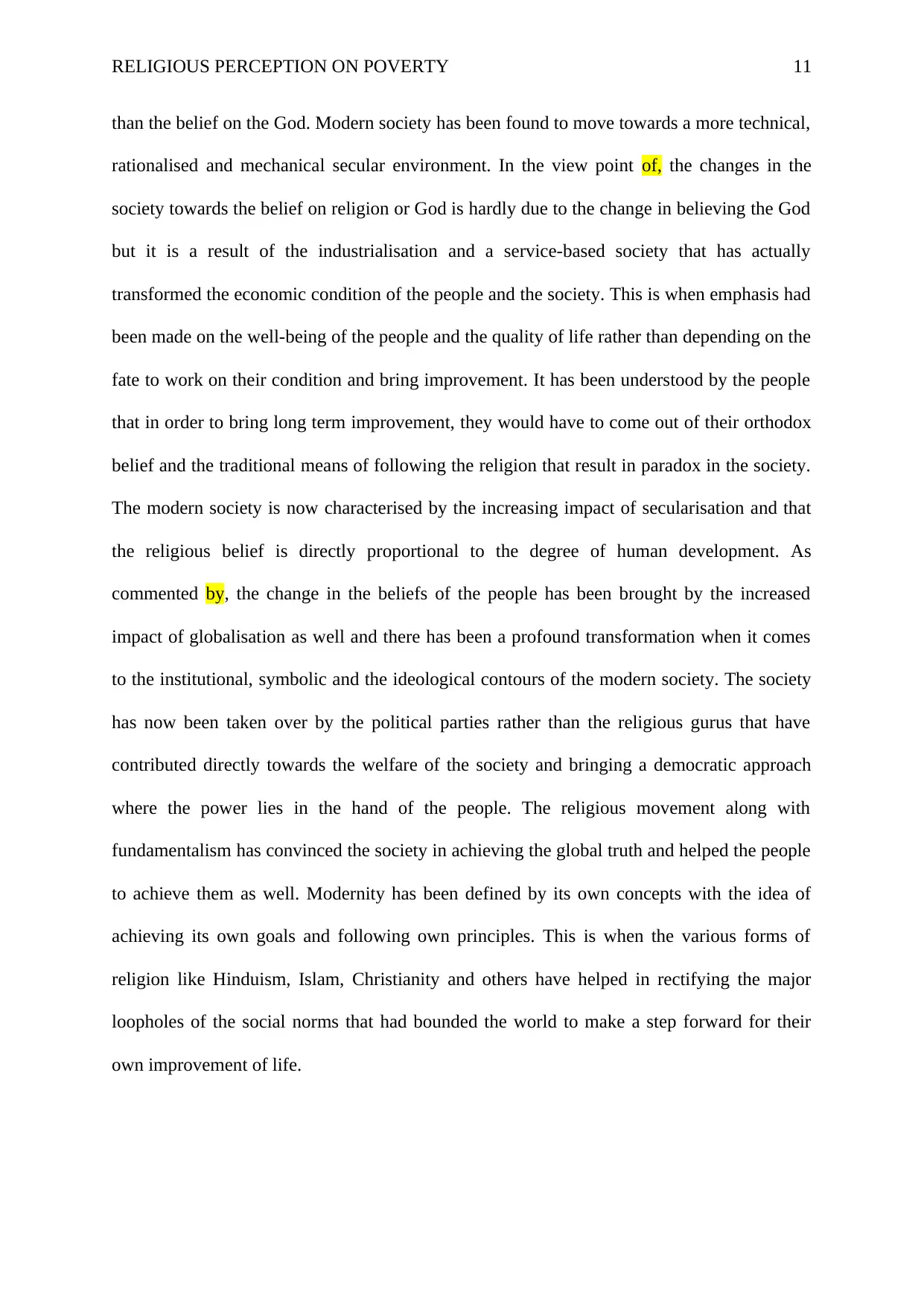
RELIGIOUS PERCEPTION ON POVERTY 11
than the belief on the God. Modern society has been found to move towards a more technical,
rationalised and mechanical secular environment. In the view point of, the changes in the
society towards the belief on religion or God is hardly due to the change in believing the God
but it is a result of the industrialisation and a service-based society that has actually
transformed the economic condition of the people and the society. This is when emphasis had
been made on the well-being of the people and the quality of life rather than depending on the
fate to work on their condition and bring improvement. It has been understood by the people
that in order to bring long term improvement, they would have to come out of their orthodox
belief and the traditional means of following the religion that result in paradox in the society.
The modern society is now characterised by the increasing impact of secularisation and that
the religious belief is directly proportional to the degree of human development. As
commented by, the change in the beliefs of the people has been brought by the increased
impact of globalisation as well and there has been a profound transformation when it comes
to the institutional, symbolic and the ideological contours of the modern society. The society
has now been taken over by the political parties rather than the religious gurus that have
contributed directly towards the welfare of the society and bringing a democratic approach
where the power lies in the hand of the people. The religious movement along with
fundamentalism has convinced the society in achieving the global truth and helped the people
to achieve them as well. Modernity has been defined by its own concepts with the idea of
achieving its own goals and following own principles. This is when the various forms of
religion like Hinduism, Islam, Christianity and others have helped in rectifying the major
loopholes of the social norms that had bounded the world to make a step forward for their
own improvement of life.
than the belief on the God. Modern society has been found to move towards a more technical,
rationalised and mechanical secular environment. In the view point of, the changes in the
society towards the belief on religion or God is hardly due to the change in believing the God
but it is a result of the industrialisation and a service-based society that has actually
transformed the economic condition of the people and the society. This is when emphasis had
been made on the well-being of the people and the quality of life rather than depending on the
fate to work on their condition and bring improvement. It has been understood by the people
that in order to bring long term improvement, they would have to come out of their orthodox
belief and the traditional means of following the religion that result in paradox in the society.
The modern society is now characterised by the increasing impact of secularisation and that
the religious belief is directly proportional to the degree of human development. As
commented by, the change in the beliefs of the people has been brought by the increased
impact of globalisation as well and there has been a profound transformation when it comes
to the institutional, symbolic and the ideological contours of the modern society. The society
has now been taken over by the political parties rather than the religious gurus that have
contributed directly towards the welfare of the society and bringing a democratic approach
where the power lies in the hand of the people. The religious movement along with
fundamentalism has convinced the society in achieving the global truth and helped the people
to achieve them as well. Modernity has been defined by its own concepts with the idea of
achieving its own goals and following own principles. This is when the various forms of
religion like Hinduism, Islam, Christianity and others have helped in rectifying the major
loopholes of the social norms that had bounded the world to make a step forward for their
own improvement of life.
⊘ This is a preview!⊘
Do you want full access?
Subscribe today to unlock all pages.

Trusted by 1+ million students worldwide
1 out of 22
Related Documents
Your All-in-One AI-Powered Toolkit for Academic Success.
+13062052269
info@desklib.com
Available 24*7 on WhatsApp / Email
![[object Object]](/_next/static/media/star-bottom.7253800d.svg)
Unlock your academic potential
Copyright © 2020–2026 A2Z Services. All Rights Reserved. Developed and managed by ZUCOL.





